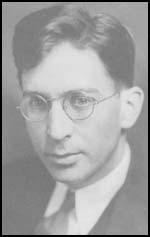Carl Weiss

Carl Weiss, the son of Dr, Carl Adam Weiss, was born in Baton Rouge in 1906. After graduating from Tulane University Medical School, he worked at Turo Infirmary in New Orleans, the American Hospital in France and the Bellevue Hospital in New York before completing postgraduate studies in Austria.
Weiss returned to the United States in 1932 and worked with his father at Baton Rouge. The following year he married Yvonne Pavy, the daughter of Judge Benjamin Pavy. By 1935 Weiss was the best known ear, nose and throat surgeon in Louisiana.
Benjamin Pavy, was one of the leading opponents of Huey P. Long. Unable to unseat Pavy in St. Landry Parish, Long decided to gain revenge by having two of the judge's daughters dismissed from their teaching jobs. Long also warned Pavy that if he continued to oppose him he would say that his family had "coffee blood". This was based on the story that Pavy's father-in-law, had a black mistress.
On 8th September, 1935, Weiss was told that rumours were circulating that his wife was the daughter of a black man. Weiss was furious when he heard the news and decided to pay Long a visit in the State Capitol Building. Long was in the governor's office, and so he waited by a marble pillar in the corridor. When Long left the office with John Fournet and six bodyguards, Weiss pulled out a .32 automatic and aimed it at Long. Weiss fired and hit Long in the abdomen. The bodyguards opened fire and Weiss died on the spot. A bullets fired by one of the bodyguards ricocheted off the pillar and hit Long in the lower spine.
At first it was thought that Long was not seriously wounded and an operation was carried out to repair his wounds. However, the surgeons had failed to detect that one of the bullets had hit Long's kidney. By the time this was discovered, Long was to weak to endure another operation and died on 10th September, 1935.
Primary Sources
(1) John Fournet witnessed the shooting of Huey Long. He was interviewed about the incident in a television documentary, Huey Long, that was made in 1985.
As he emerged there, all of a sudden, I saw a strange look in his face and at the same time I had a Panama hat in my left hand - and I saw a little gun go right close to me, within a foot or two, a black gun, automatic, and about simultaneously one of the so-called bodyguards, young fellow by the name of Murphy Roden, grabbed the gun and it went off simultaneously, because it hit Huey on the right side - so went along here and through the small of the back, you see, downward.
After a while, after they had a coroner's inquest and the man was found riddled with 59 bullets in his body, they came and knocked on the door (at the hospital) and I said: "You can't come in" and he said: "I just want to tell Huey who shot him". And Huey, loud as ever: "Let him in" - he had a big, strong voice - and of course I had to let him in. He told him a young doctor by the name of Carl Weiss had shot him. "Well," he says. "What does he want to shoot me for?"
(2) A Louisiana journalist was in the Senate building when Huey Long was shot. He was interviewed about the incident in a documentary, Brother, Can You Spare A Dime?, that was made in 1975.
Twenty years of newspaper experience failed to prepare me for the tragedy I witnessed Sunday night. I was coming out of Governor Allen's office when I heard a shot. Outside in the hall I saw Senator Long stagger away, grasping his side with his right hand. Half a dozen members of the senator's guard joined the shooting and the man who had shot Senator Long pitched forward dead from 30 or 40 bullets. The hallway was filled with smoke. Senator Long meanwhile walked down the hall, descended the stairway, was aided into an automobile and taken to the nearby Lady of the Lakes sanatorium where he died 30 hours later.
